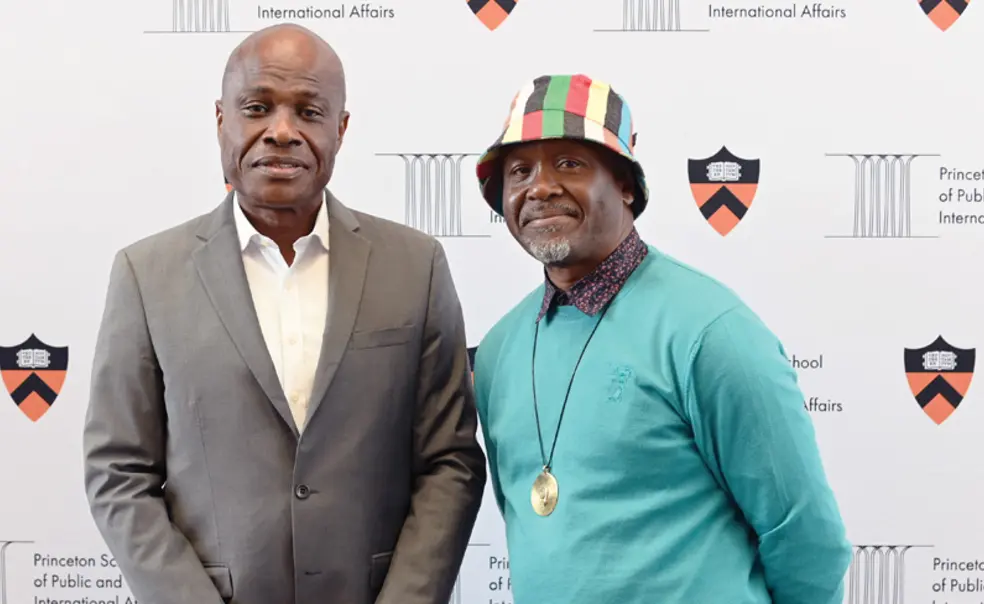Africa World Initiative Shines Multidisciplinary Spotlight on Continent
In the two and a half years since Princeton announced the creation of the Africa World Initiative (AWI), the interdisciplinary center’s wide-ranging endeavors in the humanities, artificial intelligence, entrepreneurialism, and more have laid down an ambitious road map. Already, AWI has brought esteemed African speakers to campus and propelled efforts to include African languages in artificial intelligence data sets. It’s also working with nongovernmental organizations to influence African policy and connecting Princeton students, alumni, and faculty who have ties to Africa.
There’s nothing like it “anywhere among our peer institutions right now,” according to AWI director Chika Okeke-Agulu, a professor of art and archaeology and African American studies.
The idea for AWI came to Okeke-Agulu years ago, when he was director of Princeton’s Program in African Studies and had a desire to expand offerings beyond what is typical of an academic department. He thought it was important to have “a broader set of resources, but also more substantial commitment from the University to rethink Africa’s presence in Princeton in terms of programming, curricular resources, and research initiatives … .
“Demographically speaking, Africa will be the most important continent in the next few decades,” Okeke-Agulu said, due to its fast-growing and relatively young population. The New York Times reported that one in four people worldwide will be African by 2050.
After conversations with Deborah Prentice, then the University provost, AWI was born as a collaboration between the African studies program and the Princeton Institute for International and Regional Studies. It was announced at Reunions 2022.
Through AWI, Okeke-Agulu said, Princeton is engaging “the African continent in a much more meaningful and compelling way.”
In the Lecture Hall
AWI brings policymakers, novelists, and other African leaders to campus through two lecture series. The inaugural Africa Impact lecture was delivered this September by Martin Fayulu, a politician from the Democratic Republic of the Congo, who spoke of the need for institutional reform. Citing courts that have been “hijacked” to legitimize corruption, Fayulu again and again came back to the importance of democracy. He used Wakanda, the fictional land from Marvel’s Black Panther, as an example of something to strive for: a nation rich in resources that can also defend itself. More policymakers and politicians will follow.
The Africa World lecture series, featuring African visionaries, debuted last fall with a talk by Nigerian novelist Chimamanda Ngozi Adichie, whose works have themes of postcolonial feminism. Abdulrazak Gurnah, a Tanzanian-born British novelist and academic who won the Nobel Prize in Literature in 2021 and whose work focuses on colonialism and refugees, spoke this October.
Language and Technology
Artificial intelligence relies heavily on language to perform tasks, but despite the fact that Africa is home to more than a quarter of the world’s languages, very few are represented in the AI ecosystem. AWI is in the process of onboarding 11 African languages through the creation of nonproprietary universal treebanks, which are fundamental codes written to harvest high-quality data. Okeke-Agulu said AWI is “already getting feelers from some African countries that are interested” in support for other languages as well.
Fusion and the Global South
With scientists and representatives from the Princeton Plasma Physics Lab and other collaborators including the U.S. Department of Energy and the International Atomic Energy Agency, AWI helped form a working group — Fusion and the Global South — that brings people from Africa and Latin America in on conversations about nuclear fusion, a potentially game-changing energy source. Resources such as coal and cobalt come from the global south, yet “they’re not at the table” when it comes to research and crafting policies, according to Okeke-Agulu.
Spotlight on Innovation
The first meeting of the Africa Innovation Council — with representatives from South Africa, Rwanda, Senegal, Nigeria, Egypt, Morocco, and Kenya — was held last March in Princeton to discuss “fundamental questions about why, after decades of global investment in Africa” in areas such as health care, food security, and education, “success has been far and few between,” said Okeke-Agulu. The council is a “network of individuals that have close proximity to international organizations,” such as the World Health Organization and the United Nations Development Program, who “understand the language of policy makers and government in Africa.”
In the Archives and the Classroom
The African Archives Project archives and disseminates research and work related to Africa conducted by Princeton faculty and others. This includes storage of physical materials as well as plans for a digital archive that will be accessible across the globe. For one of the first projects, AWI is partnering with a pre-existing Nigerian-based team to produce the first multi-dialectal dictionary for Igbo, which is spoken in Nigeria; AWI will host the archive.
AWI also supports courses, such as a freshman seminar on teaching computers African languages that is new this fall, as well as student internships in Africa and a postdoctoral researcher currently in their second year at Princeton.












No responses yet